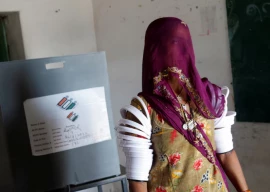
Around 60% of Pakistan’s total population is facing food insecurity, revealed Pakistan’s National Nutrition Survey (NNS) 2011 on Saturday. The results of the survey, termed by health experts as “alarming”, indicate a significant decline in the nutritional status of the people of the country over the past decade.
This information was disclosed at the launching ceremony of NNS 2011 held here at a local hotel. The national survey, conducted by Ministry of Health’s (MoH) Nutrition Wing in collaboration with Agha Khan University (AKU), assessed the nutritional status of the population, especially women and children, while also covering morbidity and family care practices.
The survey took a sample of 30,000 households nationwide covering all the provinces and found that around 57% of the households were facing food insecurity. In these households, 50% of the women and children were found to be malnourished. “This confirms that the maternal and child malnutrition remains a major issue for Pakistan,” the report said.
The report stated that iron deficiency (anaemia) and vitamin A deficiency remains widespread in the country, however, iodine deficiency rate had reduced during the last decade. Other important nutritional indicators measured by the survey included maternal anaemia at 49%, night blindness 16%, child stunting level 43%, while wasting among children (child’s weight-for-height measured less than -2 standard deviations from the mean) was found to be 13%.
The survey found major differentials for chronic malnutrition between provinces, with Sindh, Balochistan and Federally Administered Tribal Areas being the major contributors to childhood malnutrition in the country.
Health experts noted that the increasing rate of chronic and acute malnutrition in the country is primarily due to poverty, higher illiteracy rate among mothers and the government’s lack of commitment towards ensuring food security to each and every citizen. They also attributed it to the inherent problems in infant feeding practices and access to “right” foods.
The health experts said that the survey provides “unquestionable evidence of the problem of malnutrition in Pakistan”. They said that the levels of malnutrition are unacceptably high and will not only represent a challenge in reaching millennium development goals but will also constrain economic growth.
They suggested that a concerted multi-sector national and provincial nutrition strategy along with oversight mechanisms were needed to address mother and child health and nutrition problems.
“The statistics on the nutritional status are also very alarming and there is a need to integrate strategies to overcome malnutrition,” said Mona Sheikh of World Food Programme Pakistan. Dr Zulfiqar Ahmed Bhutta of AKU said that stunting among children is among the major problems the country is facing. “These children are our country’s future, and they are at stake,” he added.
MoH Islamabad Nutrition Wing’s Deputy Director General Dr Baseer Achakzai said the population of Pakistan is fast increasing and resulting in complexity of the health and nutrition-related problems. Conducting a nutritional survey at this stage holds immense importance and would help in policy making, he added.
The launching ceremony was attended by government officials, representatives of the United Nations Children Fund (Unicef), World Food Programme (WFP), Food and Agriculture Organization (FAO), World Health Organization (WHO) and donor agencies including USAID, AUSAID and DFID.
Published in The Express Tribune, September 18th, 2011.
COMMENTS (1)
Comments are moderated and generally will be posted if they are on-topic and not abusive.
For more information, please see our Comments FAQ


















-(1)1714116455-0/Heeramandireactions-(2)-(1)1714116455-0-270x192.webp)














1714024018-0/ModiLara-(1)1714024018-0-270x192.webp)









Dear friend,
The survey findings presents alarming situation of the country food and nutrition insecurity. I would like to have details of the survey where i can find it? is there area wise situation analysis in the report?
Regards